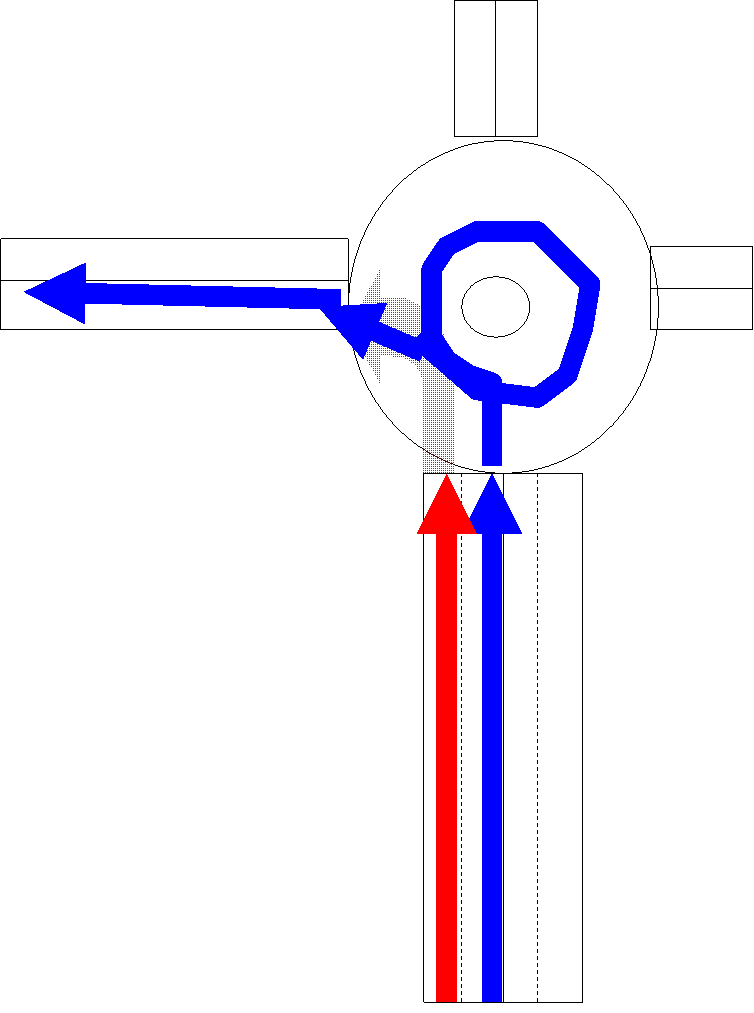My twins had their birthday the other day so we went to Paulton’s Park, a local theme park for young children with a section called Peppa Pig World, and my boys love Peppa Pig.
All sounds rather unphilosophical so far. But that was until we pulled off the M27 and hit the short dual carriageway to a roundabout which led to a single carriage road to the park itself. The drive would normally take somewhere in the region of a minute. Or less. Apart from it took us an hour. One whole hour of my life I will never get back.
However, many, many drivers got there very quickly, at my and other’s expense.
Let me explain by use of poorly constructed Publisher picture.
OK, so if you are not conversant with roundabouts (we Brits love ’em), then you should know that I was in the inside red lane which is the filter lane for turning left. In other words, to turn left to go to Paulton’s Park, you must be in the left hand lane. However, if you are complete wanker, selfish idiot, then you can pretend to need to turn right and sit in the outside lane (blue) but go right round the roundabout, NOT turning off right, and coming back around to have RIGHT OF WAY through, past the red lane, to Paulton’s Park. So, us do-gooders, sitting in the red lane, literally sat unmoving on this 500 metre road for AN HOUR. And we did that because everyone streaming down the blue lane could cut us up selfishly, taking advantage of us doing the ‘right’ thing.
And so, enter stage right, the free riding problem. As wiki states of this:
A free rider, in economics, refers to someone who benefits from resources, goods, or services without paying for the cost of the benefit. The term “free rider” was first used in economic theory ofpublic goods, but similar concepts have been applied in to other contexts, including collective bargaining, antitrust law, psychology and political science.[citation needed] Free riding may be considered as a free rider problem when it leads to under-provision of goods or services, or when it leads to overuse or degradation of a common property resource.[1]
Although the term originated in economic theory, similar concepts have been cited in political science, social psychology, and other disciplines. Some individuals in a team or community may reduce their contributions or performance if they believe that one or more other members of the group may free ride.[2]
This is precisely what was happening. If we had all decided to go in the right hand lane, then everyone would have had to have waited their turn appropriately. But because half of us did the ‘right’ thing, the other half got to take advantage of us and get there in a matter of minutes.
I can’t begin to tell you how angry I was. I was clocking the cars that went past, and when I did eventually get round the corner, I was behind a car I had seen overtake me in the blue lane only minutes before.
I swore at him like a man possessed a la Michael Douglas in Falling Down. And then promptly had to park behind him in Paulton’s Park…
Of course, I couldn’t turn off my path, even though it was clear that that was what every driver on the right hand lane was doing (they all had baby or child seat in the rear) – by this time I had successfully adopted the moral high ground.
No, my own path to righteousness was one of swearing.
For a philosophical treatise on the free rider problem and its relationship to the prisoner’s dilemma, see here: http://plato.stanford.edu/entries/free-rider/.

